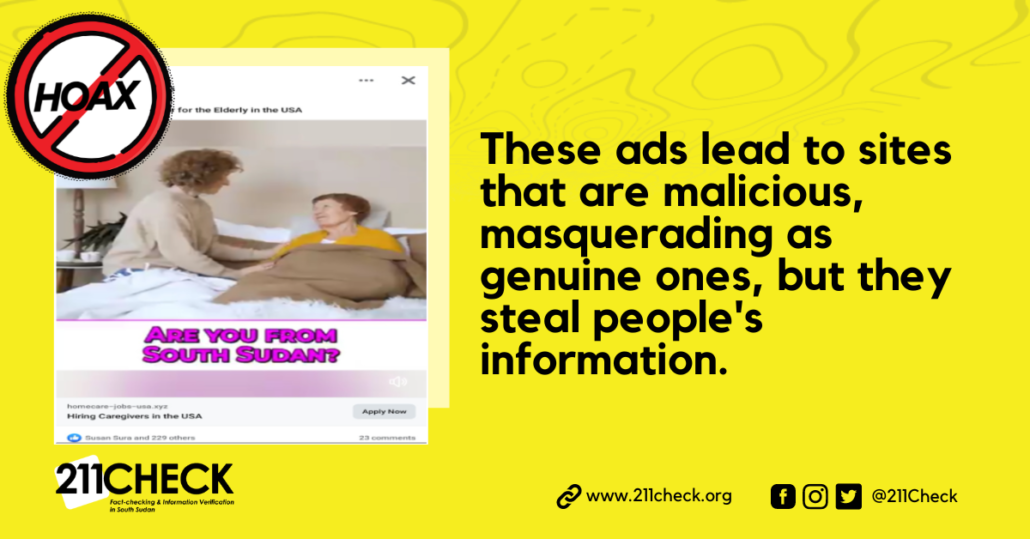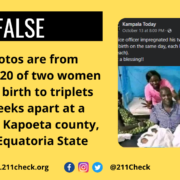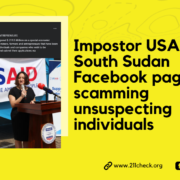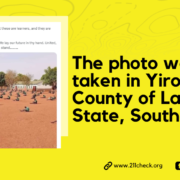Fact-check: “Are you from South Sudan?” Job Scams
These sites are malicious, masquerading as genuine ones, but they steal people’s information.
Writer: Jibi Moses
If you are a regular Facebook and Messenger user, you must have encountered multiple sponsored Facebook job advertisements on various pages. The pages which run a series of these ads claim there are jobs in the US or Canada for people from South Sudan.
These pages, among others, are; Exact Grant (here, here and here), Jobs Global Center (here) and Study for You (Here).
The adverts run with different headings, such as “Hiring Caregivers in the USA | jobs as a night carer for the elderly” and “Looking for jobs that are right for you.”
These posts claim that the jobs include housekeeping, elderly caregiving, driving, supermarket attendants, construction and painting. The pages make further claims about how people will be paid per hour, ranging from 25 USD to 50 USD, depending on what one intends to apply for, and every opportunity doesn’t require experience.

Investigation:
These adverts are everywhere on Facebook and are concentrated on South Sudanese. And many people were commenting, showing interest in applying for these jobs, which raised concern, and 211Check ran an investigation. However, on opening the site, they immediately lead one to Home-care-jobs-usa-xyz.
This also has several other sponsored adverts, including, among others, Americanmobile.com, TravelNursing.com, and Travel Nursing Jobs. These are legitimate Nurse staffing agencies with enough experience in doing their work according to the detailed information on their websites and the whois details, all located and registered in the United States of America. Here are their whois details respectively. (Here, here, here). These three companies were registered long ago, the earliest in 1997 and the latest in 2001.
However, on scanning the link Home-care-jobs-usa-xyz using Virustotal, 211 Check found that it has a suspicious, as detected by Forcepoint Threatseeker.
As it operates, Forcepoint ThreatSeeker Intelligence: Monitors popular websites to see if they’ve been compromised or hijacked. Follows breaking news, trending topics and viral social media to identify additional content to assess.
A browser hijacker is a malware program that modifies web browser settings without the user’s permission and redirects the user to websites the user had not intended to visit. It is often called a browser redirect virus because it redirects the browser to other, usually malicious, websites.
Cybercriminals create malicious websites to steal data and plant malware such as ransomware. These websites often masquerade as legitimate ones and use phishing emails to lure visitors
Conclusion
The adverts running through different platforms claiming to offer jobs to South Sudanese are mainly false; these ads contain malware intentionally created to divert users to websites they don’t intend to use. These sites are malicious, masquerading as genuine ones, but they steal people’s information.
To ensure accuracy and transparency, we at 211 Check welcome corrections from our readers. If you spot an error in this article, please request a correction using this form. Our team will review your request and make the necessary corrections immediately, if any.
It is crucial to fight against misinformation and disinformation in mainstream and alternative media by avoiding becoming a victim of fake news. To prevent the spread of false information, you must refrain from sharing content you are unsure about or unaware of its origin. Disinformation and misinformation can be incredibly dangerous because they can mislead people and cause harm. For instance, false information on health matters can lead to wrong decisions that can put people’s lives at risk. Therefore, it’s vital to fact-check information before sharing it to promote accurate and reliable information. Visit https://211check.org/ for more information on our fact-checking process, or send us a WhatsApp message at +211 917 298 255 if you want to present a claim. Our team will promptly respond to your request because we believe #FactsMatter.









Leave a Reply
Want to join the discussion?Feel free to contribute!